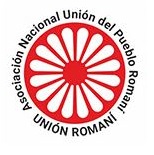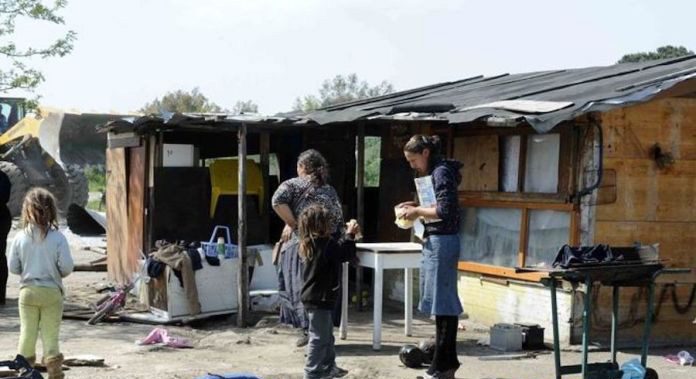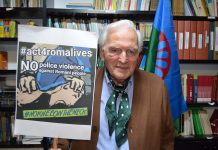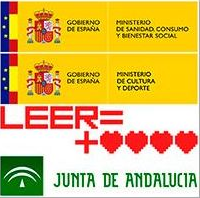Persecution against gypsies in Italy is reaching levels of unprecedented severity. It isn’t a stretch to say that our brothers and sisters residing in beautiful Italy are facing a similar period of violence and disgrace to that which our ancestors suffered through in the 1930s in Germany. The Romani Holocaust, as we have highlighted numerous times previously, was not the consequence of one drunken, racist night out in 1940 in which a maniac ordered the extermination of all European gypsies. These things, fed by false information about the danger of certain minorities, simmer over time among the general public. Gypsies had already been banned from public places such as parks, fairs and public toilets during the 1920s. Then in 1934, the year after Hitler came to power, sterilisation campaigns began whereby men were castrated. And if this wasn’t enough to eliminate the survival of a people, in 1935 the Laws for the Protection of German Blood and German Honour, notoriously known as the Nuremberg Laws, were enacted. Ultimately, when hatred or ignorance prevent us from seeing a human being as deserving of the same dignity that should be equal for all humans, then the greatest atrocities imaginable can be committed.
On the night of the 9th November 1938, the ‘Kristallnacht’ (Night of Broken Glass) took place across Austria and Germany. In those hours, the Sturmabteilung (SA), a paramilitary that operated under the orders of the Nazi Party, set about burning and destroying Jewish-owned properties as well as carrying out the most brutal of lynchings. All of this happened under the gaze of the German Government who looked on at the destruction without intervening.
Well, the same thing happened to the gypsies of the time. In that same year of 1938, ‘Gypsy Clean-up Week’ was established which culminated in 1940 with one of the first signs of terror that opened up the gates for genocide: 250 Romani children were executed in Buchenwald concentration camp in order to test the efficiency of Zyklon-B, the chemical that would later be used in the gas chambers of Auschwitz-Birkenau. In 1945, following the defeat of the Nazi regime, three quarters of the gypsy population residing in Germany had been executed.
So what is happening in Italy?
To quote Don Quijote, comparisons are odious. However in this case a comparison is unfortunately apt. We are seeing too many parallels between the events of Nazi Germany during the Second World War and what is happening today in Italy and other parts of Europe. Go out and look if you don’t think it’s true.
We cannot fail to acknowledge the most recent of events whereby 450 people have been forcibly evicted from a camp in the settlement of Giugliano, Naples. There are now 73 families who are living on the streets. A dear collaborator of the Unión Romaní, Carlotta, wrote to me from Rome explaining that these families have nowhere else to live nor seek refuge as the authorities have seized the cars and vans where they had found emergency shelter. The degree of alarm and persecution is so severe that the authorities have even issued a warning in the local town of Giugliano advising residents to remain alert as a large group of gypsies are roaming the countryside without knowing where to settle.
The most shocking part of this matter, however, is that it involves gypsy families of Bosnian origin who have been settled in Italy for more than 30 years. The Association ’21 de julio’ (21st of July) has reported that these families are rough sleeping and consequently lack access to electricity, drinking water and even toilets. There are many children up to the age of six who are in need of milk and they have only been able to gather a total of 50 nappies for the babies. It has been confirmed that there are a dozen pregnant women among the population as well as numerous elderly women. All are clearly lacking the most basic of aid, including Ginevra, the youngest girl of the evictees at only 8 days old.
An unanswered question
I am told by various gypsies already well versed in evictions that throughout their many years living in Italy they have been removed from their modest huts and forced into other locations. At the very least they should have been offered the necessary information about where to move to, but this has not been the case.
Police turned up in Giugliano and told the gypsy families that they ‘had to leave the municipality as soon as possible otherwise they would come back with bulldozers and move them by force.’ To which the defenceless inhabitants of the camp asked:
– And where are we to go, sir? To which the officers replied:
– You will have to decide, providing it is outside of the municipality limits.
On Daniele Barbieri’s blog, I have read four shocking testimonies of the crimes that are being committed against these people. Antonio María Mira came to know of this news very early on and left us this testimony:
As soon as we arrived we were asked for milk for the little ones. But they also wanted to explain. “We are Italian citizens, we have passports” they said whilst showing their documents. “I was born here, I grew up here and I am 20 years old.”
Another resident said: “I came to Italy after the Bosnian war and I arrived here more than 30 years ago. All of the young people were born here and are, therefore, Italian citizens but Italian citizens without real rights.”
Money in Limbo
The Campania District granted €915,418.29 to mayor Antonio Pozziello in order to meet the most urgent needs of the people of Giugliano. Let it be noted that we only know the destination of two allocations worth a total of €200,000. “And as for the remaining €715,418.29, it was never specified where this money was allotted.” This has been disputed by the ‘Associazione Nazione Rom’ (Italian National Rom Association) who have brought the case’s attention to the Head of the Council of Ministers, the President, the Chief Administrative Office of Naples and to local and regional authorities.
With the European Parliament being suspended the Unión Romaní has directed its efforts towards the European Commission in Brussels with the intention that they will intervene immediately and put a stop to the helpless situation that the Romani people in Italy are suffering through.
But the most abhorrent of all
For me at least anyway, is that out of the 450 evicted people in the Giugliano camp, 105 are children who were attending school as usual where they were receiving the country’s mandatory education. They have also been evicted from school and have had their elementary education interrupted!
This is a crime against humanity.
This English translation has been possible thanks to the PerMondo project: Free translation of website and documents for non-profit organisations. A project managed by Mondo Agit. Translator: Tom Curran.







